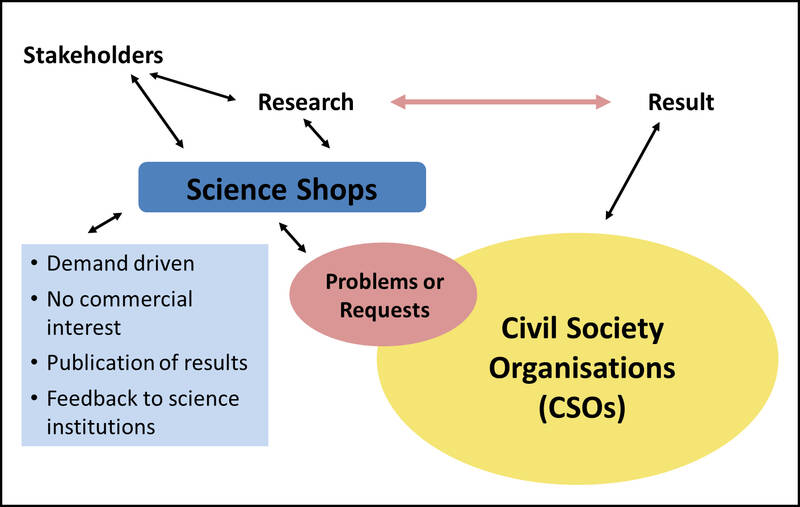1. How does a Science Shop work?
1. How does a Science Shop work?
Science Shops define themselves as a ‘unit that provides independent, participatory research support in response to concerns experienced by civil society‘. For the most part, these units belong to universities, though some are organised as separate NGOs or non-for-profit companies. Science Shops combine research (and teaching where applicable) with service to society.
Science Shops use the term “science” in its broadest sense, incorporating social and human sciences, as well as natural, physical, engineering and technological sciences. The word “provide” in the definition means that Science Shops make their services available on an affordable basis, free of financial barriers.
Furthermore, Science Shops seek to create equitable and supportive partnerships with civil society organisations, hence the word “participatory“. The word “equitable” in this mission statement also means that knowledge and ideas from society are used as a cross-fertilisation to the research field; it’s a two way street. “Research support” can include educational projects, but makes clear that there is a difference with regular social/welfare based support to society. The words “in response to“, so it’s not a science push type of operation. The word “concerns” makes clear that Science Shops are not there to answer curiosity-driven questions.
Civil society organisations can simply approach a Science Shop with a problem in which they feel some research would be helpful for them to help solve their problem. The Science Shop staff will then transfer these requests into research projects and find students and/or staff to work on these projects, in close contact with the “client”. The results are handed over to the client and the Science Shop staff will support the use of these scientific results by the client and will help to formulate follow-up proposals, both those relevant to the client and those relevant to further research.
This process means that new knowledge is generated, or at least existing knowledge is combined and adapted to context.

Science Shop staff usually performs the following tasks:
- Receive/solicit clients and (new) societally relevant questions
- Map the problem (articulation)
- Preliminary research: Refer, Refuse, Advice or Formulate (scientific) research question (and funds if required)
- Find a (co-) supervisor
- Find a student or researcher
- Maintain communication and process, from start to finish of research
- Facilitate useable presentation/publication of results
- Support client in implementing results and recommendations
- Make inventory of follow-up research or research-themes
- Education and trainings for civil society, et cetera.
